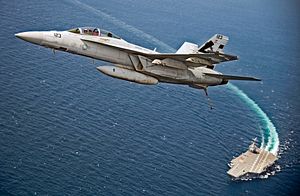U.S. Deputy Defense Secretary Patrick Shanahan endorsed shock testing the nuclear-powered aircraft carrier USS Gerald R. Ford (CVN-78), the lead of ship of the U.S. Navy’s latest class of carriers, in a March 26 letter to Senate Armed Services Committee Chairman John McCain, Bloomberg reports this week.
“We agree with your view that a test in normal sequence is more prudent and pragmatic,” Shanahan writes. The U.S. Department of Defense and the U.S. Navy are now in agreement to shock test the carrier’s key systems and assess how well they do under combat conditions.
“Good news from [Department of Defense] that they intend to shock test USS Gerald R. Ford,” Senator John McCain tweeted on April 5. “Full ship shock trials before first deployment will help address concerns w/reliability of unproven new technologies on board.”
Shock trials “which have been going on for many decades in the U.S. Navy, involve the detonation of underwater charges,” I explained in February. ”Depending on the outcome of the shock trials, design changes may be necessary prior to a ship assuming initial combat duty.”
James F. Geurts, assistant secretary of the Navy for research development and acquisition, announced last month that the service would drop its opposition to shock trials and delay the tests by at least six years in order to expedite the USS Gerald R. Ford’s operational deployment.
The principal reason behind the service’s push to delay any trials was the fear that it would cause additional delays to the operational deployment of the new aircraft carrier increasing the pressure on an already overstretched surface fleet.
Rather than conducting shock trials with the USS Gerald R. Ford, the U.S. Navy initially suggested shock testing the Ford’s follow-on, the future Ford-class carrier USS John F. Kennedy, which is slated to be launched with a two-year delay in 2020. The cancellation of the shock trials were calculated to move up the combat deployment of the Ford by a year from 2022 to 2021.
One of the reasons for the recent controversy surrounding the possible cancellation of the trials are the many new and largely untested systems installed aboard the USS Gerald R. Ford, as I explained previously:
The USS Gerald R. Ford, commissioned in July 2017, is equipped with a host of new and untested technologies, including the carrier’s two main turbine generators, a new dual-band radar system, advanced weapons elevators, and a new advanced arresting gear on the flight deck. (U.S. President Donald Trump objected to the installation of some of the new systems such as General Dynamics’ new electromagnetic aircraft launch system aboard, as I reported in May 2017.)It is precisely the reliability of these new systems that the Pentagon’s wants to thoroughly test.
Total cost for the USS Gerald R. Ford are estimated at $12.9 billion-the most expensive warship in the U.S. Navy’s history.
































